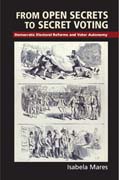
From Open Secrets to Secret Voting: Democratic Electoral Reforms and Voter Autonomy
Mares, Isabela
The expansion of suffrage and the introduction of elections are momentous political changes that represent only the first steps in the process of democratization. In the absence of institutions that protect the electoral autonomy of voters against a range of actors who seek to influence voting decisions, political rights can be just hollow promises. This book examines the adoption of electoral reforms that protected the autonomy of voters during elections and sought to minimize undue electoral influences over decisions made at the ballot box. Empirically, it focuses on the adoption of reforms protecting electoral secrecy in Imperial Germany during the period between 1870 and 1912. Empirically, the book provides a micro-historical analysis of the democratization of electoral practices, by showing how changes in district level economic and political conditions contributed to the formation of an encompassing political coalition supporting the adoption of electoral reforms. INDICE: 1. Introduction; 2. The protection of voters' autonomy; 3. Electoral intimidation by state employees; 4. Electoral intimidation by private actors; 5. The production of irregularities at times of elections: a quantitative analysis; 6. The adoption of electoral reforms; 7. Labor scarcity, rural inequality, and electoral reforms: the determinants for electoral reform of the Prussian electoral system; 8. Voting for opposition candidates: economic concentration, skills, and political support for social democracy; 9. Dilemmas on the right and the road to proportional representation; 10. From macro- to micro-historical analysis in comparative research.
- ISBN: 978-1-107-10021-3
- Editorial: Cambridge University Press
- Encuadernacion: Cartoné
- Páginas: 286
- Fecha Publicación: 17/06/2015
- Nº Volúmenes: 1
- Idioma: Inglés
